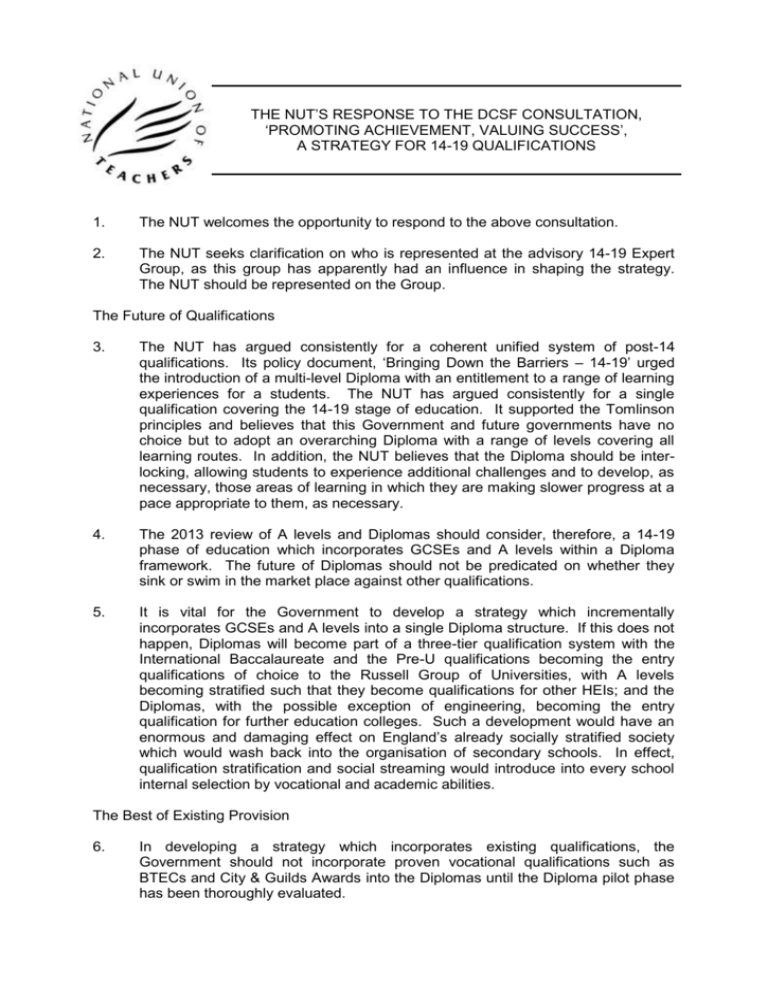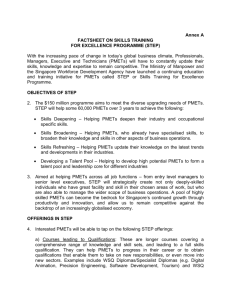a strategy for 14-19 qualifications
advertisement

THE NUT’S RESPONSE TO THE DCSF CONSULTATION, ‘PROMOTING ACHIEVEMENT, VALUING SUCCESS’, A STRATEGY FOR 14-19 QUALIFICATIONS 1. The NUT welcomes the opportunity to respond to the above consultation. 2. The NUT seeks clarification on who is represented at the advisory 14-19 Expert Group, as this group has apparently had an influence in shaping the strategy. The NUT should be represented on the Group. The Future of Qualifications 3. The NUT has argued consistently for a coherent unified system of post-14 qualifications. Its policy document, ‘Bringing Down the Barriers – 14-19’ urged the introduction of a multi-level Diploma with an entitlement to a range of learning experiences for a students. The NUT has argued consistently for a single qualification covering the 14-19 stage of education. It supported the Tomlinson principles and believes that this Government and future governments have no choice but to adopt an overarching Diploma with a range of levels covering all learning routes. In addition, the NUT believes that the Diploma should be interlocking, allowing students to experience additional challenges and to develop, as necessary, those areas of learning in which they are making slower progress at a pace appropriate to them, as necessary. 4. The 2013 review of A levels and Diplomas should consider, therefore, a 14-19 phase of education which incorporates GCSEs and A levels within a Diploma framework. The future of Diplomas should not be predicated on whether they sink or swim in the market place against other qualifications. 5. It is vital for the Government to develop a strategy which incrementally incorporates GCSEs and A levels into a single Diploma structure. If this does not happen, Diplomas will become part of a three-tier qualification system with the International Baccalaureate and the Pre-U qualifications becoming the entry qualifications of choice to the Russell Group of Universities, with A levels becoming stratified such that they become qualifications for other HEIs; and the Diplomas, with the possible exception of engineering, becoming the entry qualification for further education colleges. Such a development would have an enormous and damaging effect on England’s already socially stratified society which would wash back into the organisation of secondary schools. In effect, qualification stratification and social streaming would introduce into every school internal selection by vocational and academic abilities. The Best of Existing Provision 6. In developing a strategy which incorporates existing qualifications, the Government should not incorporate proven vocational qualifications such as BTECs and City & Guilds Awards into the Diplomas until the Diploma pilot phase has been thoroughly evaluated. A New Committee to Advise on the Approval of Qualifications 7. While the creation of a new Joint Advisory Committee for Qualifications Approval appears to be a logical step, it is not clear what its relationship will be with OFQUAL and the Sector Skills Councils in determining a 14-19 qualifications policy. 8. It will be essential for teacher organisations to be represented on all three bodies and for OFQUAL, at least, to be required to have regard to the advice of the Joint Advisory Committee. Operational Issues Commencing the Diplomas 9. There are serious operational issues that need to be addressed before the introduction of the first five Diplomas in September 2008. Issues such as the setting of grade boundaries within the Diploma assessment system are still to be resolved. Schools and colleges have yet to be told about the nature of the internal assessment procedures that form part of the Diploma qualification. Schools, colleges, parents and students must be assured that these operational problems will be resolved. 10. Resources must be properly distributed in order for the Diploma roll-out in September 2008. It is crucial also that the 14-19 partnerships are involved in discussions concerning the funding allocations to individual institutions in the Diploma Consortia. There have to be effective consultative forums in place between local authorities and stakeholders. 11. The NUT believes that the 14-19 qualifications system needs to be stabilised. Relying on market forces to decide the future of A levels is a weak indicator for long-term 14-19 educational planning. 12. It is important also that the accountability system is changed to promote collaborative working. This applies to Ofsted inspections and national performance measures. 13. While the DCSF may be working closely with the Diploma Development Partnerships, with the Awarding Bodies and with other key partners on how best to make existing qualifications available within the Diplomas, it is extraordinary that just a few months before the introduction of the first five Diplomas that these alignments have yet to be exemplified. If so much work has yet to be completed, then the DCSF has to reconsider its timetable for the introduction of phases 2, 3 and 4 of the Diplomas. Phase 1 can only be a pilot, given the fact that the numbers of students in the first phase have dropped to around 20,000. The pilot should be evaluated properly and lessons learnt before the introduction of the next phases. The work yet to be done on the Diplomas, as outlined in Chapter 3 of the consultation 14. There are issues yet to be resolved on: the rules of combination in relation to the different elements within the Diplomas; what the nature of the specialist provision looks like within the Diplomas; how internal assessment will be organised in the Diplomas; and how functional skills will be integrated within the Diplomas. The success of the new qualification depends on getting these ‘technical’ but important elements in place. New GCSEs and Functional Skills 15. The concept of functional skills is ill thought out. If English, mathematics and ICT GCSE specifications need adapting to new developments in workplace and social life, then such an option should be introduced on a planned and evolutionary basis with proper consultation with the teaching profession. Simply announcing the introduction of a Functional Skills element and demanding that Level 2 passes are needed to achieve Grade C and above will disadvantage large numbers of learners unfairly and arbitrarily. The Foundation Learning Tier 16. The NUT supports the development of the Foundation Level Diploma, but has argued consistently that the achievements of all students should be marked and celebrated, including those who have not achieved five or more grades A*-C at GCSE level. Recognition of the achievements of those who are at Foundation Level and, indeed, those who are at ‘pre-Foundation’ level, would better motivate young people to aspire to Level 2, and beyond, to remain in learning beyond the statutory school learning age. 17. Students with special educational needs should have the greatest possible access to a balanced and broadly based curriculum. Accreditation for such students should be based on the same scale of progression as for all students. 18. The proposals seem, however, to be advocating a four-track approach which is not an integrated 14-19 system of education. This could perpetuate a divisive system in which certain routes are valued more than others. 19. The NUT seeks further clarification on the nature of the units and qualifications that will work in the progression pathways as part of the Foundation Learning Tier. The NUT is interested to know how the pathways ‘built around a philosophy of robust initial assessment, ongoing review, target setting and individual advice and support’ will work in schools, in relation to timetabling and the deployment of staff in schools. There are serious implications for planning at school level as more personalised learning, more pupil training, and more vocational learning is introduced. 20. These planning demands need to be monitored as they impact on curriculum management, staff, professional development opportunities for teachers and lecturers, funding and levels of resources for institutions. Apprenticeships 21. The NUT supports the proposal that apprenticeships should be part of an integrated strategy between key parties, such as schools, young people and employers, and that there should be progression pathways between other Diploma and apprenticeship programmes. The NUT has argued consistently, however, that apprenticeship places are unlikely to meet the Government’s target of an entitlement to give every young person who is suitable and wants one an apprenticeship by 2013. There needs to be a major expansion in employer engagement. The public sector must play a much more significant role than it currently does in offering apprenticeship places. 22. The NUT supports the TUC’s assertion that the minimum apprenticeship pay rate must be increased. Improving pay will make apprenticeships more affordable and will impact positively on completion rates and on perceptions of quality. Boosting pay will support women’s equality in apprenticeships. The Government should make proactive use of levers to promote equality and diversity in apprenticeships in order to avoid occupational segregation. The Four Routes : A Levels and GCSEs, Diplomas, Apprenticeships and the Foundation Learning Tier 23. The proposals state that qualifications which do not fit within the four main routes will be withdrawn if it is proven that they do not meet the needs of young people, employers, universities and ‘wider society’. The NUT has serious concerns that proven vocational qualifications, such as BTECs and OCR Nationals, will be withdrawn without a proven vocational qualification in place. This will place a severe restriction of choice for learners who want to follow a vocational pathway. Conclusion : ‘Making It Happen’ 24. The NUT is concerned that there will be an overload of agencies set up to oversee, approve, commission and advise on 14-19 qualifications. 25. The new Office of the Qualifications and Examinations Regulator (OFQUAL) will need to ascertain whether there are fundamental risks associated with the introduction and delivery of the Diplomas, the Functional Skills Qualification and the Foundation Learning Tier (FLT). 26. The NUT notes that Joint Advisory Committee for Qualifications Approval will bring together representatives of business, HE and other parts of the education sector, to advise the Secretary on whether qualifications meet the new benchmarks for approval. It notes also that the new Regulator (OFQUAL) and the Young People’s Learning Agency will work alongside the Sector Skills Councils, the Diploma Development Partnerships and the 14-19 Partnerships. It is questionable how much synergy can be maintained in such a bureaucratically laden landscape. As OCR has said: “It remains to be seen whether this model will make it impossible to achieve approval for anything but the bare minimum or if it will lead to the championing of a plethora of new qualification-based initiatives. Either way, there will be more bureaucracy and delay.” 27. The NUT seeks clarification on the role, constitution and powers of the Joint Advisory Committee for Qualification Approval and its relationship with the new Regulators. 28. There is no mention of how practitioners can be represented on these advisory boards or, indeed, if they can have access to this ‘inner circle of experts’ who have already advised on the proposals in this document. 29. It is important that practitioners who are involved in the Diploma pilots are given clear opportunities to feed back design problems as part of a proper evaluation process in order to avoid the problems which occurred with past qualifications, such as GNVQs and AVCEs. 30. There is risk associated with the new Diplomas because of the different demands of the components. Learners may be able to succeed in the additional specialist learning that comprises the Diploma but may find it difficult to pass all the elements of Principal or Generic Learning that will allow them to succeed in the full Diploma. 31. These proposals must also be considered alongside other recent policy documents in this area which affect 14-19 learning: notably, the ‘Machinery of Government’ proposals, ‘Raising the Age of Compulsory Learning’, and the emerging profile of the 14-19 Partnerships. 32. The NUT welcomes the proposal that there will be a requirement for a representative from a 14-19 partnership to be a member of each Schools Forum. As local 14-19 commissioned plans are developed, these local forums will take on a more significant role. 33. The NUT welcomes the Government’s recognition of the need for a single creditbased framework for all 14-19 qualifications. This has the potential for providing flexibility for learners and supporting learner progression. As qualifications have become more modular, achievement should be recognised in such a framework. 34. ‘A properly trained and supportive workforce’ is mentioned in the last paragraph of the proposals. There is evidence that schools and colleges in the Diploma Gateway have not received the relevant and focused professional development that will be needed for effective delivery beginning in 2008. Indeed, as the NUT has indicated, even now teachers and lecturers still await new developments on how grades will be awarded in the Diploma, how internal assessment will be operated, what the nature and content of specialist provision is in the Diploma and how functional skills will be integrated in the Diploma system. If the various Government bodies are still working on these technical aspects now, confidence in the effective introduction of the Diplomas has to be questioned.







